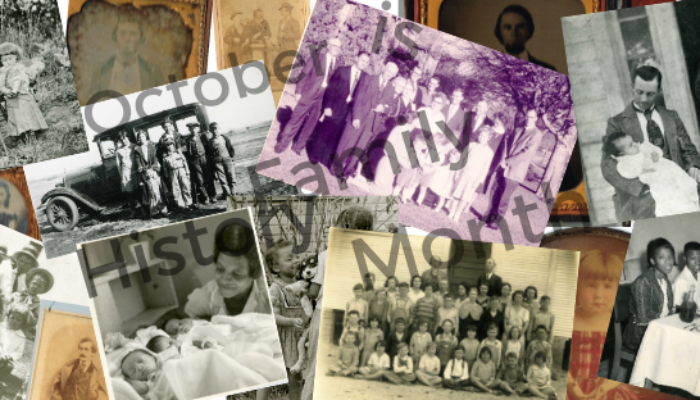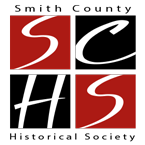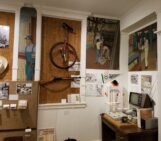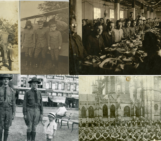
In celebration of October, as Family History Month, the Smith County Historical Society will join the Genealogy Network of Texas (GNT) for a collaborative event on October 18, 2019 from 10 am – 8:30 pm. The GNT is a state-wide initiative to connect libraries and provide educational and research opportunities and is spearheaded by the Genealogy Center of the Waco-McLennan County Library. The GNT will provide a series of eight live streamed programs with up-to-date topics.
This live webinar will be shown on a projection screen in the Smith County Historical Society Payne Auditorium. You may attend as many of the sessions as you wish at no charge. Members of the S.C.H.S. and East Texas Genealogical Society will be present to assist you and provide other support if needed. Handouts will be available to attendees.
State-Wide 2019 Genealogy Lock-In Program of Events (October 18, 2019)
Sponsored by the Genealogy Center of the Waco-McLennan County Library and the Central Texas Genealogical Society
10:00 – 10:50 am – Technology Enabled Collaborations for Genealogists Tony Hanson, Family Historian
This presentation will examine three relatively new capabilities that are enabling collaborative family research: The Family Search Family Tree, Ancestry.com’s ThruLines DNA tool, and self-publishing family history using a blog or a website. Attendees will learn the benefits provided by each and will learn how to effectively incorporate them into their own personal research methodology.
11:00 – 11:50 am – Finding Elusive Records on FamilySearch.org John Huff, FamilySearch Experience Manager
Learn the search skills and features of FamilySearch.org to take you to a new level of access of this 2 billion image database. This tutorial will take you step-by-step through the process of how to utilize the FamilySearch catalog, unindexed image collections and more.
Noon – 1:30 pm – Genealogy Basics: Getting Started on Your Family Tree Carl Smith, Genealogy Librarian, Montgomery County Memorial Library System
Budding researchers will learn the basics they need to get started researching their family tree. We’ll cover the first steps to take to begin your research, starting with home sources. We’ll also cover the types of records that are useful for genealogical research and where they can be found. We’ll also cover ways to stay organized by utilizing paper charts and forms or computer software.
1:40 – 2:40 pm – Probate: More Than a Will Kelvin Meyers, Ancestry ProGenealogists, Researcher
Most persons in America, who lived to adulthood, left some type of an estate to be administered. Some left wills, some did not; either way if there was land or large amounts of personal property, their estate had to be disposed of. The records of probate can be some of the most fruitful for the genealogist.
2:50 – 3:50 pm – Roll Call: New Sites and Sources for Military Records and Research Curt B. Witcher, MLS, FUGA, IGSF Manager, The Genealogy Center Senior Manager, Special Collections, Allen County Public Library
This presentation explores the growing number of consequential websites for the researcher interested in military history and military ancestors. From bibliographic databases to sites that provide copies of first-hand accounts and images of actual records, this talk provides one with key sites and strategies for locating increasing amounts of meaningful military data on the Internet.
4:00 – 5:15 pm – Introduction to GEDmatch Sara Allen, Librarian, Genealogy Center, Allen County Public Library
Once you have taken a DNA test, you may be urged to upload your results to GEDmatch. What is GEDmatch and why should you use it? GEDmatch is a free third party website that you can use to compare your DNA results with people who have taken the autosomal DNA test from all the major testing companies. You can also use a variety of tools and utilities (some free, and some subscription only) that help analyze your DNA results. Learn more about GEDmatch at this session.
5:15-6:15 pm Dinner Break
6:15 – 7:15 pm – Finding Your Ancestors in Mexico Nick Cimino, Professional Genealogist, AncestorPuzzles.com
Nick Cimino will provide case studies demonstrating the types of records used to trace ancestors from the United States into Mexico. There is a breadth of information available for researchers including census, border crossing records, immigration, civil records, and church records.
7:25 – 8:30 pm – Dating Family Photos by Photo Process, Apparel, Hair Styles and More David Coleman, Director, the Wittliff Collections, Texas State University
Do you possess photos that you wish you could at least date? Learn what to evaluate and the resources available to help you. Follow David’s process as he takes us through samples and learn how to apply his technique to your own photos.


